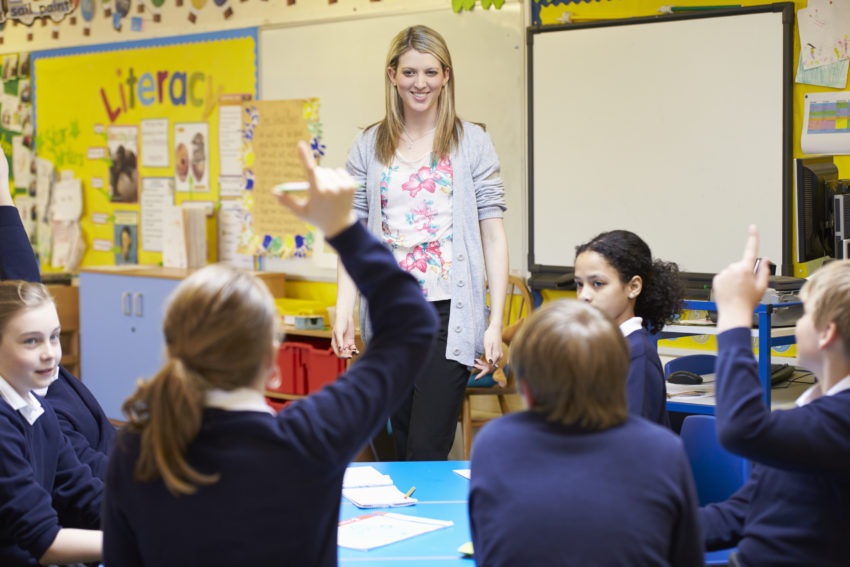In a 2020 survey, almost 40% of primary schools stated that pupils do not always receive language teaching according to the time allocated each week throughout the year. In the same survey, 25% of respondents provided comments on good practice which has helped them to overcome issues in language learning in their school, meaning that 75% of schools in the survey might be struggling to design an effective whole-school language curriculum. [1]
Donna Lee, Headteacher at Nettleworth Primary School shared with us the importance of including modern foreign languages in the curriculum and how a school-wide programme has been developed to include languages at Nettleworth Primary. This post is part of a series of contributions from Donna, following on from first piece discussing using Pupil Premium to support disadvantaged pupils.

What are the benefits of including Modern Foreign Languages in the Curriculum?
Learning another language presents opportunities for the reinforcement of knowledge, skills and understanding developed in English, especially in the development of speaking and listening skills. It also helps compound the skills required to elicit meaning from text and the knowledge and understanding of grammar and sentence construction. Other benefits of learning a language include:
- Develops phonological skills, particularly phonemic awareness in learning familiar and unfamiliar sounds
- Links sound with mime, gesture and facial expression, which consolidates meaning and brings language to life
- Extends children’s understanding of how speakers of different languages use gesture, volume and intonation
- Provides opportunities to develop learners’ listening skills for both gist and detail
- Allows children to revise and consolidate basic discrete listening skills, to look at the person speaking, ignore distractions, and use context of the conversation to increase understanding
- Exposes children to a wide range of genres of listening texts – both interpersonal and information-based and allows for discussion on strategies to cope with these
- Stresses the importance and value of listening to texts more than once in order to build up a clear picture of content
Languages are particularly useful and appropriate for pupils whose second language is English and special educational needs(SEN) students. These students benefit from the targeted scaffolding and support provided for helping pupils understand listening texts in the foreign language.
Learning languages further aids learners in coping with the unknown, providing them with skills to cope with unfamiliar languages and content. Through written passages, they learn the key reading comprehension skill of looking for known language embedded in unknown material and working from that to deduce the unknown and unfamiliar vocabulary.
The Learning of Speaking a New Language
Talk is the underlying key factor in the development of MFL. In learning a new language, pupils reproduce sounds, create phrases and sentences, and engage in simple conversations. Learning a new language helps pupils with numerous skills:
- Makes pupils aware that different languages have different sounds
- Makes pupils learn about the importance of pronunciation and intonation and formal and informal use of language
- Develops pupils’ awareness of the need for clear and specific pronunciation to achieve successful communication
- Develops key presentation skills, allowing for discussion on the use of voice, register and eye contact
- Allows children to practice and discuss the non-verbal communication which takes place in oral interactions
- Enables learners to develop their speaking skills – from single-word responses to replying with short paragraphs of text using connectives
- Provides opportunities for children to create and sustain roles, script and perform plays and stories
- Helps learners to use language in very specific contexts and then enables them to personalse the language and use it more freely in a creative way
- Requires pupils to learn material by heart as a natural part of the learning process-this ranges from single words to songs, short dialogues and presentations
- Enables pupils to appreciate the ‘power of language’
- Pupils can communicate with native speakers and realise that their utterances are not only understood but that they have an impact and effect change;
- Encourages children to experiment orally without the pressure of aiming for grammatical accuracy in the first instance

The Learning of Reading and Writing a New Language
Reading and writing skills are supported by, and reinforce, the development of oracy. Children become familiar with the relationship between phonemes and graphemes and they apply this knowledge in their reading and spelling. They understand, read and enjoy different forms of paper and electronic texts, such as stories, poems and messages. It helps them compare text types and styles from different countries and cultures.
Writing in a new language supports and consolidates speaking, listening and reading since children develop a basic knowledge of the writing system, spelling and structure of the language. In the early stages of learning a new language, writing may involve copying accurately or writing words or short phrases from memory, especially those with accented characters as well as labelling items. Other teaching templates and strategies familiar to primary teachers from early writing in the Foundation Stage and Key Stage 1 are used to scaffold learning and ensure accuracy. An example of this is when learners write simple sentences and short texts, often using a frame or model and from memory.
Other benefits of reading and writing in a new language:
Reading
- Develops phonic knowledge and understanding of the relationship between sounds and symbols
- Encourages learners to recognise familiar parts of words and use these to deduce the meaning of an unfamiliar language
- Allows learners to develop their skills in reading for meaning, and look for familiar words and phrases, making predictions and looking for semantic and grammatical clues
- Develops skill and confidence when reading aloud
- Exposes children to a range of text genres with which they are familiar from their experiences in literacy and encourages discussion of the features of each genre
- Offers learners the challenge of ‘cracking the puzzle’ – decoding and understanding a range of texts using a wide variety of reading strategies
Writing
- Consolidates learners’ knowledge of the differences between spoken and written text
- Consolidates the importance of attention to detail when composing a written text
- revises and allows comparison of features of punctuation in English and the new language
- Enables learners to communicate through letters and email with children in other countries
- Extends learners’ presentation skills by finding out about cursive writing styles from other cultures and the teaching and learning of these
- Promotes close attention to accuracy in spelling, in particular, the use of accented characters
Creating a Whole School Language Policy
Language learning should be planned as an integral part of the whole curriculum, adding a new dimension, rather than acting as a ‘bolt-on’ extra. Planning for language learning should also fit in with schools’ aims for the whole curriculum, building on the principles described in excellence and enjoyment.
Language plays a fundamental role not only in a child’s linguistic education but also in areas of social enrichment and cognitive development. A whole-school language policy enables a school to have a shared philosophy on all aspects of language education. It’s a dynamic action statement consisting of principles, aims and strategies; a shared document for all stakeholders and expresses a common vision of the role and status of all languages relevant to life within a school.
Ideally the language policy is developed following organised discussions, a school language audit and a profiling exercise. A healthy policy would be authored and owned by all stakeholders. It should include a rationale for its aims, as well as a declaration about who is responsible to carry out which tasks by when.
The aims should be related to:
- Raising all participants’ awareness about, and the significance of, language and the lifelong nature of language learning;
- The identification of needs of learners and of staff, and the suggestion of how to meet those needs;
- The creation of a climate of working together, building on existing linguistic resources for the benefit of everyone involved
How is the MFL policy at our school structured?
The MFL policy at our School is designed to reflect the primary MFL entitlement as defined in the Primary Languages Framework. The key elements of primary languages learning at our school are:
- Early Years Foundational Stages(EYFS)-Year 2 are taught early French phrases, culture and customs through their host country work on France.
- It’s inclusive
- French is taught as a coherent program from Year 3 to Year 6
- It is part of a broader curriculum involving language and culture
- It is expected that pupils reach recognised levels of achievement
Languages Curriculum Intent
At our school, we believe that learning a foreign language provides a valuable educational, social and cultural experience in preparation for future life. We teach French from EYFS to Year 6 in a fun and enjoyable way by choosing interesting and relevant topics that will engage and stimulate learning. This develops children’s curiosity about language.
Intent
All pupils at our Primary School have the right to a rich and deep learning experience that includes the learning the basics of an additional language. Studying languages prepares them to participate in a rapidly changing world in which work and other activities are increasingly carried out in languages other than English. Language learning provides liberation from insularity and provides an opening to other cultures.
Pupils use language to communicate information responsibly and creatively. Learning how to use languages to enable access to ideas and experiences from a wide range of people, communities and cultures across our school and wider demographic. In addition, understanding a modern foreign language increases a child’s understanding of their own language, and the building blocks which form this. The process of learning a foreign language reinforces fluency and understanding of grammar, syntax, sentence structure and verbal precision. Increased capability in the use of languages can also promote initiative and independent learning, encouraging diversity within society. We teach a curriculum that enables our pupils to become effective users of language. Additionally, they are taught to understand and have respect different cultures in our local, national and global communities.
Through the teaching of French at our Primary School, we aim to ensure:
• Every child has the opportunity, throughout Key Stage 1 and 2, to study French as a foreign language; developing their interest in the culture of other nations, communities and beliefs
• Pupils have access to high-quality teaching and learning opportunities
• Children have exposure to simple commands including day-to-day French language, including days, months, numbers and classroom instructions
• They develop an increased wider cultural understanding through our enriched and varied curriculum to which languages contribute
• Provide language informed by the National Curriculum and the skills expressed in this: Listening, Speaking, Reading, Writing and Cultural Understanding
Implementation of the Curriculum
Teachers are provided with an additional three planning days throughout the year to supplement their planning, preparation and assessment time to plan their curriculum. Within their planning time, teachers have access to a comprehensive scheme of work – La Jolie Ronde – which covers all aspects of the MFL curriculum: speaking, listening, reading, writing and cultural understanding, and progresses these skills and knowledge throughout Key Stage 1 and 2.
Activities can consist of actions, rhymes, stories, song, drama, grammar focus, video clips, air writing, sentence structure, dictionary work, book making and many more creative ways to extend, embed and combine language skills. Teachers and pupils use French in daily routines, for example, through answering the register and displaying the French date within the classroom. Alongside this, children have access to curriculum experiences that utilizes a native French speaker to develop language skills further.
The Impact of our MFL Curriculum
Our MFL curriculum is fun and enjoyed by learners, it’s well-resourced and planned to demonstrate progression through Key Stage 1 and 2.
Working with our local university-project leader of the Durham University MFL Languages Club for 2021/22 had impact on both our students and the volunteers –“volunteers were able to work with your pupils via online sessions in the previous academic year, and we would love to continue to provide language support this year. “
A volunteer led project and can offer a range of support: in lessons, 1-2-1 or small group sessions both after school or at lunch time, whatever you feel your pupils can benefit from. Volunteers are often either a language student studying at degree level, students with at least an A-Level in the language or international students who speak the foreign language natively. This provides great support for our pupils since these individuals already have such a great level of understanding in the language.
In addition, we measure the impact of our curriculum through:
- Pupil discussions about their learning
- Monitoring and reflection against subject-specific skills defined in each year of study; -Moderation, network meetings, transition
- Children applying their knowledge of language to other areas of the curriculum
- Children applying their cultural understanding and tolerance across society and cultures- Enrichment Activities, Rights Respecting Ethos.
[1] Collen, Ian, British Council, 2020. Language Trends 2020: Language Teaching in Primary and Secondary Schools in England
Register FREE to access 2 more articles
We hope you’ve enjoyed your first article on GE Insights. To access 2 more articles for free, register now to join the Government Events community.
(Use discount code CPWR50)




